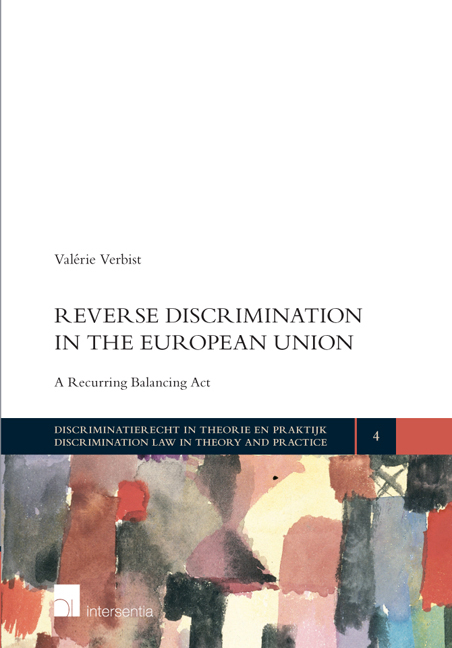Book contents
- Frontmatter
- Acknowledgements
- Contents
- Table of Cases of the European Court of Justice
- Chapter 1 Introduction
- Part I Reverse Discrimination from a Union Perspective
- Part II Reverse Discrimination from National Perspectives
- Chapter 4 Reverse Discrimination with Respect to Goods
- Chapter 5 Reverse Discrimination of Persons
- Conclusion Part II
- Part III Reverse Discrimination in a Federal State Context
- Bibliography
Conclusion Part II
from Part II - Reverse Discrimination from National Perspectives
Published online by Cambridge University Press: 29 September 2018
- Frontmatter
- Acknowledgements
- Contents
- Table of Cases of the European Court of Justice
- Chapter 1 Introduction
- Part I Reverse Discrimination from a Union Perspective
- Part II Reverse Discrimination from National Perspectives
- Chapter 4 Reverse Discrimination with Respect to Goods
- Chapter 5 Reverse Discrimination of Persons
- Conclusion Part II
- Part III Reverse Discrimination in a Federal State Context
- Bibliography
Summary
CONCLUSION BY AREA?
Apart from Italy, the Member States under analysis remedy reverse discrimination in some cases and allow it in others. Part II has discussed the assessments by national authorities of situations of reverse discrimination on the basis of the area in which these cases could be situated. The question arises as to whether a conclusion can be drawn on the basis of the area in which the reverse discrimination arises. In particular, it might be that reverse discrimination in the area of the free movement of goods is considered to be less problematic than in the area of freedom of movement for persons. That is to say, the free movement of goods is generally considered to be a less sensitive area than the freedom of movement for persons.
It was found that there were three out of five cases in the area of the free movement of goods in which the national authority allowed reverse discrimination, 1259 while there were only three out of ten cases in the area of the freedom of movement for persons in which reverse discrimination was allowed. 1260, 1261 Admittedly, only a limited number of assessments of reverse discrimination by national authorities were examined. Hence, this finding should not be given too much weight.
Moreover, there appear to be no persuasive arguments for the proposition that situations of reverse discrimination of goods should never be considered to be problematic or that situations of reverse discrimination in the area of freedom of movement for persons should always be considered to be problematic. It is submitted that the key to distinguishing problematic from unproblematic situations of reverse discrimination lies less in the area of goods versus persons, and more in the concept of compensation versus overcompensation by Union law.
APPLICATION OF THE WORKING HYPOTHESIS TO THE NATIONAL LEVEL
INTERPRETATION OF COMPENSATION AND OVERCOMPENSATION AT NATIONAL LEVEL
In Part II, the working hypothesis based on the concept of compensation and overcompensation to the national level was applied. That is to say, for each situation of reverse discrimination assessed at national level, we examined whether a mere compensation or an overcompensation by Union law was at stake.
- Type
- Chapter
- Information
- Reverse Discrimination in the European UnionA Recurring Balancing Act, pp. 257 - 264Publisher: IntersentiaPrint publication year: 2017



